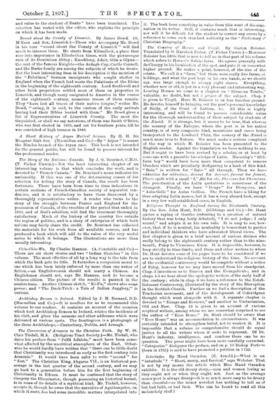The Country of Horace and Virgil. By Gaston Boissier. Translated
by D. Havelock Fisher. (T. Fisher Unwin.)—Monsieur Boissier has little that is new to tell us in that part of his volume which refers to Horace's Sabine farm. He agrees generally with de Chaupy in his localisation of the spot, and puts it on somewhat higher ground. He makes a point, however, of the size of the estate. We call it a "farm," but there were really five farms, or holdings, and what the poet kept in his own hands, as we should say, was large enough to occupy eight slaves. Everything, whether new or old, is put in a very pleasant and interesting way. Leaving Horace we come to a chapter on '• Etruscan Tombs," valuable, no doubt, but not d propos of the subject. Chap. 3 is given to Virgil. Here M. Boissier is on less familiar ground. He devotes himself to bringing out the poet's personal knowledge of Sicily, of the Coast of Latium, Sc. All this is highly interesting, and will be found to possess considerable value for the thorough understanding of their subject by students of
the .Eneid. It is strange, but it seems to be true, that whereas the scenery of the Eclogue, where the poet is in his native country, is of very composite kind, mountains and caves being transported to the Lombard Plain, the scenery of the /Eneid is much more true to Nature. We must make a serious complaint of the way in which M. Boissier has been presented to the English reader. Against the translation we have nothing to say. But it ought to have been revised by a scholar, or at least by
some one with a passable knowledge of Latin. Macaulay's " fifth- form boy" would have been more than competent to remove blunders which are peculiarly disfiguring to a book of this kind. " Baia " is written for " Beim " all through. Then we have adduction for adductum, deerent for deerunt, facerat for fecerat, Flacco spelt with a small " f," Ahi for abi, Pkecians for Pkvacians. The punctuation of the Latin quotations is sometimes of the strangest. Finally, we have " Denys " for Dionysius, and " Aulu-Gelle" for Aulus Gellius. The French have a liking for thus adapting Latin names, but it has a very absurd look, except in a very few well-established cases, in English.






































 Previous page
Previous page